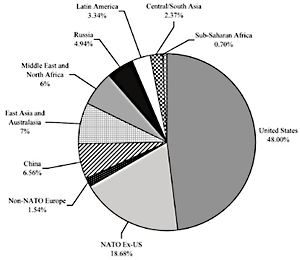In a bold statement of bureaucratic overreach, Defense Secretary Leon Panetta seemed to supersede his authority on Thursday, telling lawmakers he would not accept large military cuts under a debt deal. He compared the possibility of increasing the expected defense cuts – $350 billion in projected spending over 10 years – to a “doomsday mechanism” that would weaken America.
Such cuts "I believe would do real damage to our security, our troops and their families and our military’s ability to protect the nation," Panetta said. His newfound concern for “our troops and their families” seems implausible given his refusal to take them out of harm’s way in the various countries in which they are deployed.

The resistance to cutting the defense budget is perverse after a decade of excessive increases in military expansion. Since September 11th, defense spending has gone from $432 billion in fiscal year 2001 to a $670.9 billion request for cash currently before Congress. Furthermore, current proposals would not actually cut spending, but instead would allow the defense budget to continue to grow, merely at a less aggressive rate.
As further proof that Panetta’s statement is more political posturing than anything else, the language of the bill does not specify how much of the defense budget will actually be cut. The $350 billion number being thrown around came from a fallacious White House statement. Cuts may be directed at defense, but are likely to be spread throughout separate budgets for homeland security, intelligence, nuclear weapons, diplomacy, and foreign aid – none of which the Defense Secretary has authority over.
The minuscule defense cuts being contemplated could easily target areas of waste. As a recent report from the Center for Strategic and Budgetary Assessments found, while the source of growth in annual defense budgets since 2001 has been mostly (54%) due to the wars in Iraq and Afghanistan, much of the rest has been spent on wasteful superfluous weapons technology, bloated salaries and benefits plans, and expensive peacetime operating costs for the 900-plus military bases in 130-plus countries around the world. Still, ending the unnecessary wars in Afghanistan and Iraq alone would free up billions of dollars.
The United States could cut defense spending by half and still outspend every other country in the world. Panetta voiced concern that any decrease in spending would make it harder to face threats from Iran and North Korea, two countries with comparatively pathetic defense budgets and which present no credible threat.
Probably referring to China, Panetta also mentioned the responsibility “to project our power in the world in order to make sure rising powers understand that the United States still has a strong defense.” This adheres closely to imperial grand strategy, which insists on a foreign policy actively militarist enough so as to prevent military competitors and keep all the world’s nation’s dependent on the U.S. as military superpower. Clearly, this has nothing to do with defending the country.


